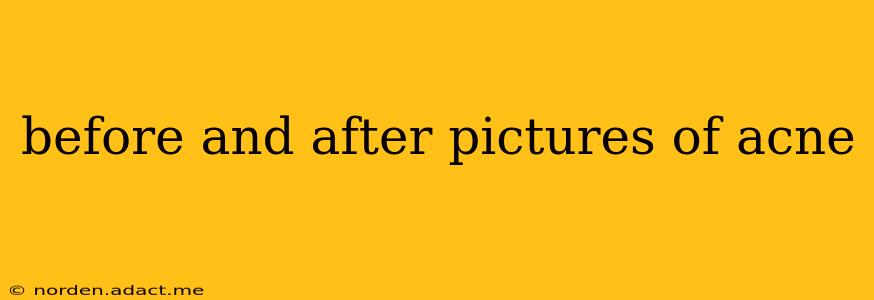Acne. The word itself can evoke feelings of frustration, insecurity, and self-consciousness. Millions grapple with this common skin condition, searching for effective treatments and hoping for clear, healthy skin. Seeing before-and-after pictures of acne treatment can be incredibly motivating and reassuring, offering a glimpse of the potential for improvement. This guide explores various acne treatments, showcases the potential for transformation (while acknowledging individual results vary), and answers frequently asked questions about achieving clearer skin.
What Causes Acne?
Before diving into before-and-after pictures, let's understand the root causes of acne. Acne develops when hair follicles become clogged with oil, dead skin cells, and bacteria. This leads to the formation of pimples, whiteheads, blackheads, and other blemishes. Several factors contribute to acne development, including:
- Hormonal changes: Fluctuations in hormones, especially during puberty, pregnancy, and menstruation, can significantly impact sebum production, a major contributor to acne.
- Genetics: A family history of acne increases your risk of developing the condition.
- Certain medications: Some medications, such as corticosteroids and lithium, can trigger or worsen acne.
- Diet: While the link isn't definitive, a diet high in processed foods and refined sugars may exacerbate acne in some individuals.
- Stress: Stress can worsen existing acne or trigger new breakouts.
What are the Different Types of Acne Treatments?
Numerous treatments are available to combat acne, ranging from over-the-counter solutions to prescription medications and professional procedures. The best approach depends on the severity of your acne and your individual skin type.
- Over-the-counter treatments: Benzoyl peroxide and salicylic acid are common active ingredients found in many topical acne treatments. These help to kill bacteria and unclog pores.
- Prescription medications: Topical retinoids (like tretinoin), oral antibiotics, and hormonal therapies are often prescribed for moderate to severe acne. Isotretinoin (Accutane) is a powerful oral medication reserved for severe, recalcitrant acne.
- Professional treatments: Procedures like chemical peels, microdermabrasion, and light therapy can help to improve skin texture and reduce acne scars.
How Long Does it Take to See Results from Acne Treatment?
The timeframe for seeing noticeable results varies significantly depending on the treatment method and the severity of your acne. Some individuals may see improvement within a few weeks, while others may require several months or even longer to achieve their desired results. Patience and consistency are key. It's crucial to follow your dermatologist's instructions carefully and maintain a consistent skincare routine.
What are Some Common Side Effects of Acne Treatment?
Many acne treatments can cause temporary side effects, including dryness, redness, peeling, and irritation. These side effects are usually mild and resolve with continued use. However, more serious side effects are possible with some medications, so it's crucial to discuss potential risks with your dermatologist.
Can Before & After Pictures Guarantee Results?
While before-and-after pictures can be inspiring, it's essential to remember that individual results vary. What works wonders for one person might not be as effective for another. Genetics, skin type, the severity of acne, and adherence to treatment plans all play a significant role in the outcome. These images should serve as motivation and demonstrate the potential for improvement, not as a guarantee of specific results.
Where Can I Find Reliable Before & After Pictures?
Searching online for "before and after acne pictures" will yield numerous results. However, it's crucial to be discerning and prioritize reputable sources. Look for images from dermatologists' websites, medical journals, or patient testimonials on reputable platforms. Be wary of heavily edited or unrealistic photos.
What Should I Do if My Acne Doesn't Improve?
If your acne persists despite trying various treatments, it's essential to consult a dermatologist. They can properly diagnose your acne type, determine the underlying causes, and recommend the most appropriate treatment plan. Don't hesitate to seek professional help; they can offer personalized advice and support.
(Note: This article does not provide medical advice. Consult a dermatologist or other qualified healthcare professional for any questions regarding your skin or acne treatment.)
